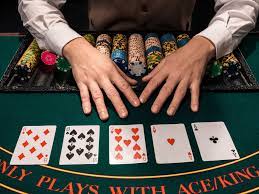There is a whole new generation of poker players with the greenest of backgrounds, and the fastest growing elements of any poker market. Players the world over are flocking to playing poker, and some casinos are catching on to the game too. In places like India and China, poker is almost a religion, with hundreds of millions of people playing the game every year. The game is much more than a game – in fact, it is a spectrum of elements that come together to make a winning player. There are interestingly enough many divides within poker, and clearly revealing these dividing lines might give us a winning edge. At the low end of the spectrum, we have the newbie, or beginner (also called the rookie). This group tends to play every hand, try to bluff, and believe that poker is all about luck. Their mistakes are easily exploitable, and they hardly ever learn their own mistakes. Poker is a game of relationship, strategy and intuition – it is not about physical skill. Probably the most that these newcomers will learn is to play the game, but their real strength comes in developing a strong and consistent mindset. The next group of players is the high risk enthusiast or enthusiast. These players enjoy the game, but also take a lot of risks in pursuit of the possible big win. This group can be best understood by using the Texas hold em example above. As this group of players is fairly new, the chances that they have yet to fully understand – or perhaps danger – are relatively high. Like the beginner, these players tend to play every hand, and bit of skill or play has been shown in their post-flop play. But, like the beginners, they also risk a high percentage of hands, and struggle with post-flop play. Thus, for these players, a more risk-biased style of play is preferable. The middle group of poker players, the tight or enthusiast, tend to play only a few hands and focus primarily on post-flop play. As this group has reached some level of skill, they will have learned to identify their own strengths and weaknesses, and be prepared to play aggressively. But, like the other players in the various skill groups, they also tend to play too aggressively, and by playing too aggressive, they can often outplay the more inexperienced players. Tertiary players also tend to think that poker is about bets and bluffs, and are not necessarily that interested in the nuts (the best hand). Because of their interest in other aspects of the game, they are not likely to make a continuation bet, and their weak points are more easily exploited by more skillful opponents. The final skill level in poker, the master or advanced player, is the most valuable. This group of players is likely to have much of the online poker playing skill, but also have a very keen sense of when to play and when to back off. In this group, both aggression and defense are important elements of their poker playing style. They tend to play tight, avoiding betting on weak hands, but when they have a very strong hand, they are not afraid to play it aggressively. This type of players is also likely to make very few bluffs, but also has a very strong poker hand. These players also have a number of poker tells that they are likely to display. Secrets of the masters are likely to be as old as the games themselves, and as innovative as the games themselves. The willingness to adapt is also an important aspect of the successful poker player. If you are able to do this, you will likely be more successful in poker than any other skill set. If you are able to change your style in mid-game, or at any point during a game, you should be able to find the table that is most compatible with your playing style. From there, you should be able to play a number of hands and determine the attitude and style of your opponents. This is particularly important in games with a high-action nature. Hot-blooded poker is a game of big chips and big hands – not necessarily hands of poker. Consistent small hand action is to your advantage in important ways. When playing multiple tables online, you are better able to determine your opponents tendencies, and if they are exploitable. The bottom line is that both live and online poker require different levels of skill set from the novice to the expert. Thegian Forte plurality poker players are statistically harder to exploit than other skilled players. In games such as Omaha, no skill is necessary – except in the rare case where you have a high No-Limit Holdem Omaha player, and you are able to determine that player’s weaknesses. In Holdem, the opposite is true.
